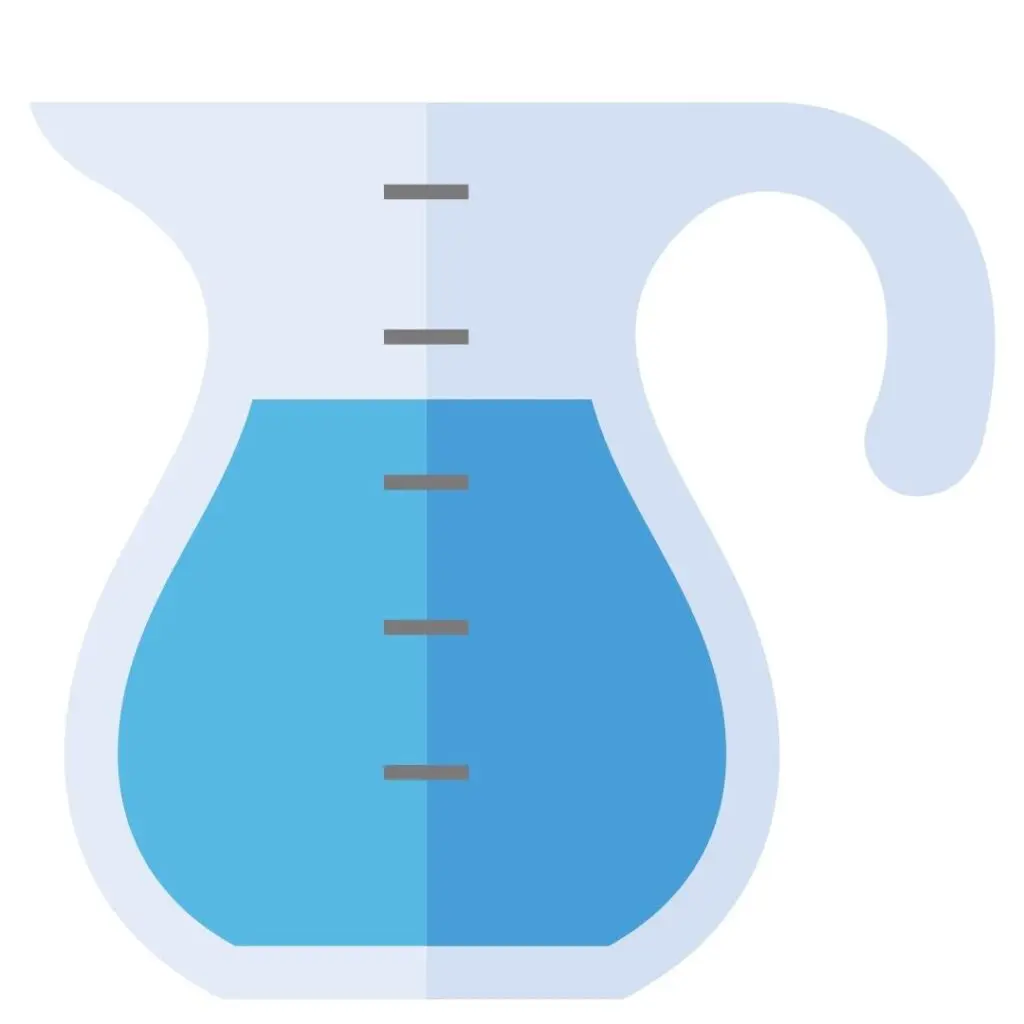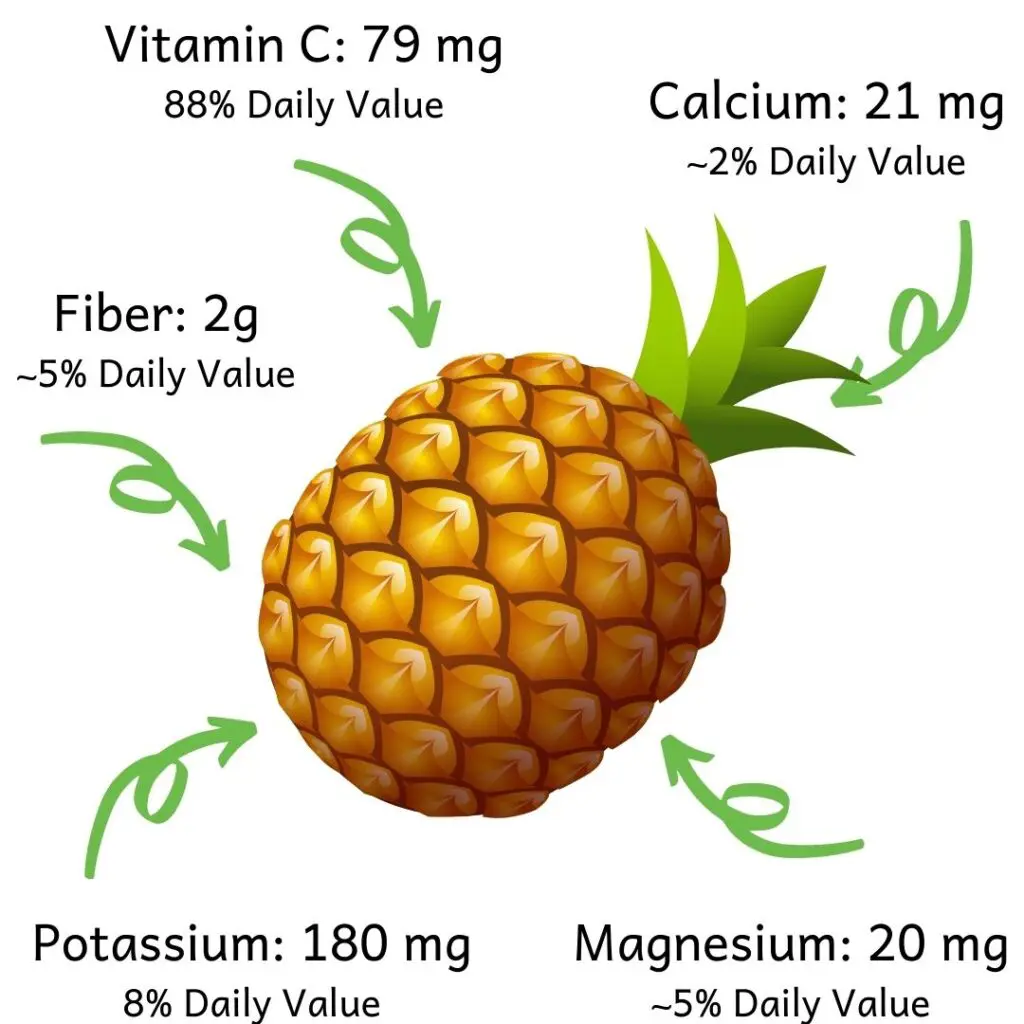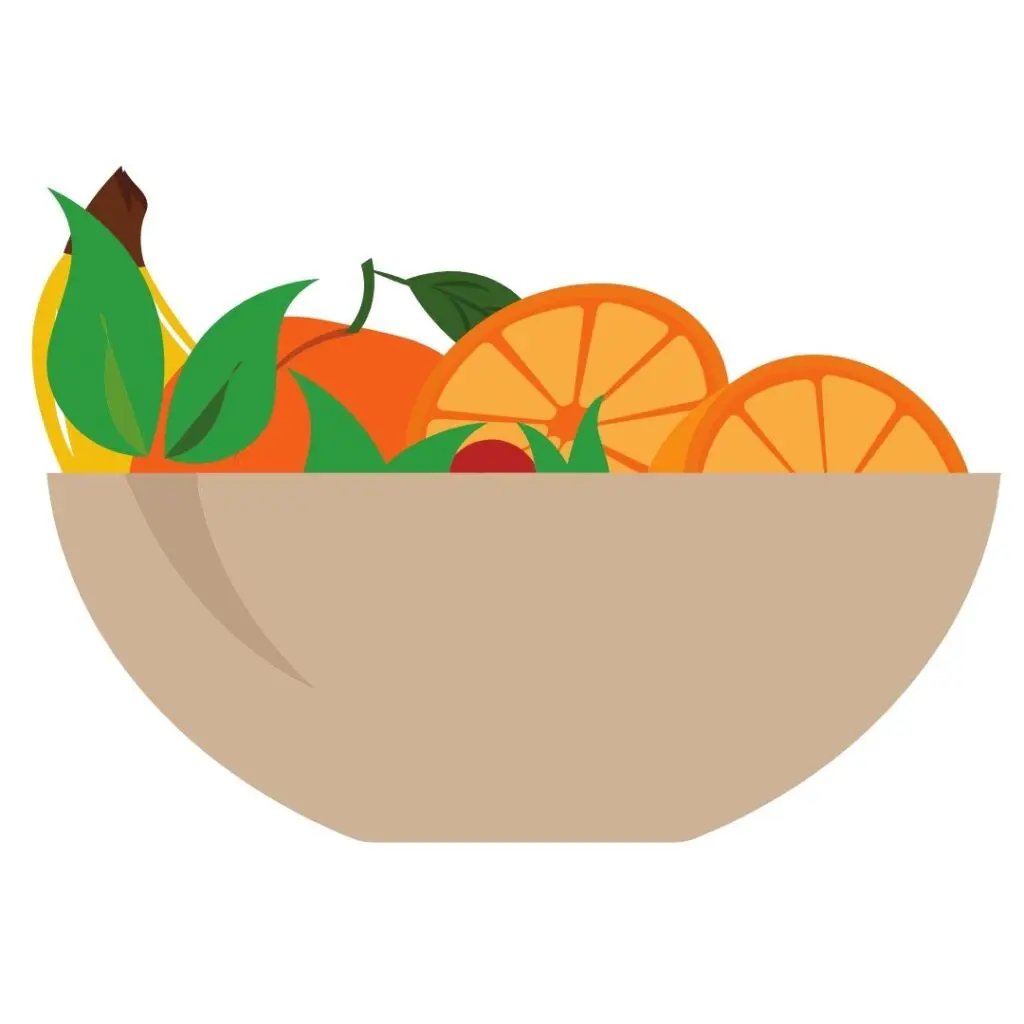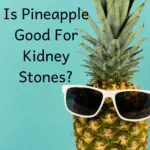Have you heard that you should eat pineapple, or drink pineapple juice, to prevent or dissolve kidney stones? Is this true? Is pineapple good for kidney stones?
*Please note that this post contains clearly identified affiliate links. If you click on these link and choose to make a purchase, I may receive a commission (at no cost to you).
Table of Contents
What Prevents Kidney Stones?
Before we jump into learning if pineapple is good for kidney stones, it is important to know what you can do to prevent kidney stones in the first place.
Drink Lots of Water
Perhaps the most important thing you can do to prevent kidney stones is to drink lots of fluid. The American Urological Association recommends drinking enough to make 2 1/2 liters of urine each day to prevent kidney stones.(1) For most people, this means drinking about 3 liters of fluid each day.
Using a high-tech water bottle, such as the HidrateSpark* can help you meet your water goals!

Stay Away From Salt
Controlling how much salt you eat is key to kidney stone prevention. A high sodium diet can cause kidney stones by increasing the amount of calcium in your urine.
Limit sodium to 2,300mg per day.(1) This is about the amount of sodium in 1 teaspoon of salt. Remember, the first step to following a low sodium diet is to choose foods that are low in salt in the first place!
Get In Your Fruits & Vegetables
People who eat lots of fruits and vegetables have a much lower risk of kidney stones.(2) Fruits and vegetables are rich in healthy vitamins and minerals, have a low diet acid load, and provide citrate. Citrate is a powerful inhibitor of kidney stone formation.
Nearly all fruits are great for kidney stone prevention. If you like pineapple, it is a tasty choice to help get in your fruits and veggies!
Eat A Well Balanced Diet
Overall, the best thing you can do to prevent kidney stones is to eat a well-balanced diet. Learn more about healthy eating for kidney stone prevention.
Pineapple Nutrition
Like many fruits, pineapple is a great source of fiber, vitamin C and other vitamins and minerals. Like most fruits, pineapple is also very low in sodium, protein and fat.

Bromelain
Pineapple also contains an enzyme called bromelain. Bromelain is historically used as a meat tenderizer because it can break down collagen and other proteins, making meat more tender and tasty! (3)
In animals, bromelain can reduce inflammation related to inflammatory bowel disease. (4)(5) It may even help reduce the effects of metal toxicity.(6)
Research related to kidney stones and bromelain is sparse. One small study found that supplemental bromelain, in addition to tamsulosin (Flomax), made more stones pass without medical intervention. However, bromelain did not make stones pass faster.(7) Because supplements were used in this study, it is unclear if eating pineapple (or, drinking pineapple juice) provides enough bromelain to help pass kidney stones. Much more research is needed before bromelain (or pineapple) can be recommended for kidney stone prevention and treatment.
Citrate
Pineapple also has a compound called citrate in it. Citrate is also known as citric acid. Citrate binds to calcium and stops calcium kidney stones from forming. In fact, citrate is commonly prescribed as a medication to prevent kidney stones.
Citrate is common in most fruits, but is especially high in citrus fruits. This is the reason behind the common advice to drink lemon juice for kidney stone prevention.
Pineapple does have some citrate in it. (8) Eating pineapple, along with other fruits and vegetables, can help increase urine citrate and prevent kidney stones.
If your urine citrate is very low, you may not be able to raise it with food alone and you might need medication. Ask your doctor what is right for you.
Oxalate
Limiting how much oxalate you eat may be important if your urine oxalate is high. Fresh pineapple is a great choice for a low in oxalate as it has only 4mg of oxalate per cup. Pineapple is a great low oxalate snack choice!
Be careful with dried or canned pineapple. A 1/2 cup of dried pineapple has 30mg of oxalate. Canned pineapple has 24mg oxalate per 1/2 cup. Processing can modify the amount of oxalate in food.
Pineapple juice is low with only 3mg oxalate per 4oz serving.
Pineapple & Kidney Stones
Pineapple For Kidney Stone Prevention
No research has been done to see if pineapple, specifically, can reduce the risk of developing kidney stones. Or, if pineapple can dissolve or help pass kidney stones.
However, fruit, in general, is a very good thing to help prevent kidney stone formation. People who eat lots of fruits and vegetables are less likely to form kidney stones. (2)

If you enjoy pineapple, eating it along with a variety of other fruits can help prevent kidney stone formation.
How Much Pineapple Should I Eat?
Aim to eat at least 5 servings of fruits and vegetables per day. One cup of fresh pineapple counts as one serving of fruit.
Remember, it is more important to eat a variety of fruits, rather than focus on a single type.
Pineapple for Dissolving Kidney Stones
No research has been done to see if pineapple can dissolve kidney stones. Pineapple is not recommended to help pass or break up kidney stones.
Pineapple Juice for Kidney Stones
Pineapple juice does have all the same vitamins, minerals and citrate as pineapple. However, fruit juice does not have fiber like whole fruit does.
Fiber in whole fruit slows sugar absorption and reduces spikes in blood sugar and insulin. High blood sugar and high added sugar intake can contribute to kidney stones.(9) Drinking your fruit via juice, rather than eating whole fruit, robs you of those great fiber health benefits.
In fact, fruit juice is usually associated with a higher risk of kidney stones.(10) Pineapple juice is not recommended for kidney stones.
The Verdict: Is Pineapple Good For Kidney Stones?
Yes! Fresh pineapple is a great food to incorporate into a balanced diet for kidney stone prevention. However, pineapple is not necessarily better than other fruits. If you like pineapple, enjoy it along with a variety of other healthy fruits and vegetables.
Happy Eating!
Melanie



Love this post about Pineapple. Please help, The link for uric Acid stone diet is not working.
Hi Janet. I’m glad you enjoyed this post. I’m not sure which link you are referring to – but here is a link to my uric acid kidney stone post!
Hi Melanie, Thank you for the info on pineapple, I love eating fresh pineapple – only problem it spikes my sugar. I eat lots of apple instead – I see good results from eating apples. Also, I received my results from the 24 hours urine test – from what I understand (100% calcium and Oxalate). I am scheduled to visit the stone clinic in Oct. So, I will know more then. Since, talking with you and reading your healthy information, I have a foundation to follow. Thank you sooo very much.
Thanks so much for your kind comment! I’m so glad you’ve learned so much. Let me know if you ever want help understanding those 24-hour urine test results from a nutrition perspective!
I use 2 drops of lemon essential oil in a glass of water to start my day. I understand that the essential oil is made from the rind of the lemon, which may provide other benefits as well, no?
I’m not aware of any benefits oils from lemon would provide. They would provide little to no citrate.
Eat plenty of fruit and vegetables you say. Not true. There are more oxalates in vegetables than fresh meat, the worst being spinach, rhubarb, nuts, seeds, wheat, potatoes, some beans, soya. Red meat and white meat are all GOOD at preventing kidney stones.
Too much meat can actually cause your body to produce oxalate. It also can increase your urine calcium (the most common cause of kidney stones – NOT high urine oxalate) and reduce your urine pH making stones more likely. Kidney stone nutrition is MUCH more than just oxalate – and oxalate may not even be important for many people.
Thank you very much for providing all that valuable information. Your articles are very helpful to me.
I have kidney stones and cyst as well, to follow a combined diet is really hard. I would like to discuss with my 24 hrs collection urine results. How can I make an app with you?
Maria
Hi Maria! Thank you so much for your kind comment. I work with people in Kidney Stone Nutrition School – VIP enrollment includes direct help from me through the process. I’d love to see you there!
Why is canned pineapple so much higher in oxalate than fresh pineapple?
That is SUCH a great question, and I really wish I had a good answer for it! I would expect canned pineapple to be a LITTLE higher than fresh simply because it is more concentrated (just like any cooked fruit or vegetable!). BUT, this large of a difference doesn’t make a ton of sense. BUT, this is what the Harvard list and analysis showed.
I love reading your information I am very health conscience of everything these days!!!👍👍🙏🙏🙏😉😉😇😇
I learned that my kidney stones are hyperuricosuria? Do you know what recipes I should look at and implement? Not sure what this means but I know it’s different than oxalates.
Hi Madison! It sounds like you have uric acid kidney stones. And, yes! Nutrition is different. Generally, drinking a lot of water, avoiding processed meats, too much alcohol and eating a lot of fruits and veggies are the hallmarks of healthy eating for uric acid stones. Here is a link to an Instagram post I did about uric acid stones!
I recently found out thru an Ultrasound that I have a non obstructing right renal calculi 9mm in size. I’m waiting to see a Urologist. I’m hurting badly. I eat alot of fruits and drink lemon water through out the day and eat a balanced diet. The only saving grace right now is a cold pack throughout the day and heating pad at night.I can only take tylenol for pain and that doesn’t help. Any suggestions. This is affecting my day to day life.
Hi Donna! I’m so sorry to hear about your stone. I hope this passes quickly! Other than drinking a LOT of water, there isn’t much nutrition can do to help kidney stones pass. The magic really comes in when it becomes time for PREVENTING more stones from happening. Make sure to ask for a 24-hour urine test so you get a personalized prevention plan! I can help you figure out what to eat with that information!
Castor oil packs with heating pad works better then painkillers and will also help to shrink the stones I’ve used this myself and it works
Thanks for the suggestion! There is no research or biological reason why castor oil in any form would help shrink stones. But, they could certainly help you feel better!